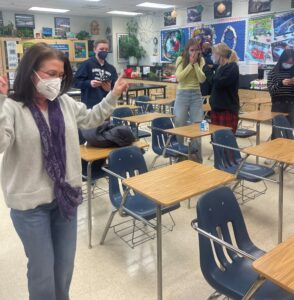
Student Experiment to be included on Suborbital Rocket Payload
A team of Washington-Liberty High School students were one of 57 winning teams in the first-ever NASA TechRise Student Challenge designed to attract, engage, and prepare future science, technology, engineering and mathematics professionals.
The winning teams will gain real world STEM (Science, Technology, Engineering and Math) experience by building experiments that autonomously operate and collect data from the edge of space aboard a suborbital rocket or a high-altitude balloon.
Administered by Future Engineers, the challenge aims to inspire students to seek a deeper understanding of Earth’s atmosphere, space exploration, coding, and electronics, as well as an appreciation of the importance of test data. Nearly 600 teams applied, representing 5,000 students in grades 6 through 12 from across the country.
The team from Washington-Liberty includes the following students:
- Seniors – Rijan Busal, Dylan Duangudom and Sophia Phelps
- Juniors – Pia Wilson and Ava Schwarz
- Sophomores – Wyatt Hogan, Xinyuan Hu, Qiaojing Huang, Mariam McClure-Simonyan and Caleb Rice
- Staff Mentor – Jeffery Carpenter
For their experiment, the students chose to leverage an existing technology called scintillators to see if this technology can be used in space to detect and map Gamma Rays and X-Rays. Since scintillators produce visible light as a by-product, the experiment will also look at using this visible light to produce electricity via a solar cell to power small scale electronics.
The winning teams will each receive $1,500 to build their experiments and a NASA-funded spot to test them, either on suborbital rocket flights operated by Blue Origin or UP Aerospace, or on a high-altitude balloon flight from Raven Aerostar. The selected student teams will build the payloads in preparation for flight test, targeted to take place in early 2023.
Nearly 500 volunteer judges, including teachers, NASA personnel, and technology subject matter experts reviewed the entries. Proposals were evaluated on criteria including the originality of their flight experiment idea, its impact on education and/or society, and the quality of the build plan. The winning teams come from 37 states and territories and include more than 600 students. Winners can be found on the Future Engineers website.
 Contact
Contact  Calendars
Calendars Careers
Careers Engage
Engage  District
District



